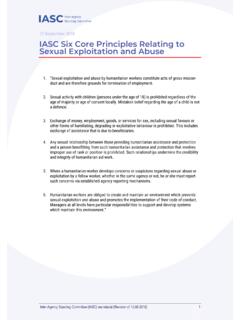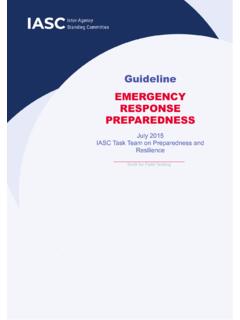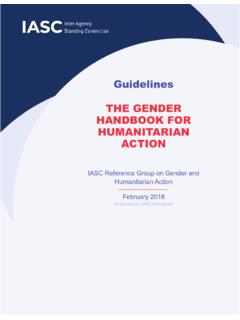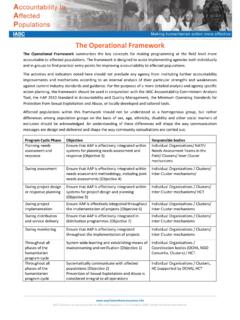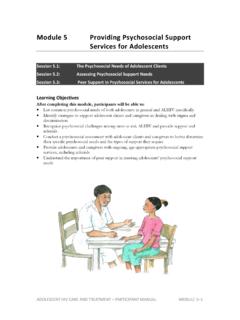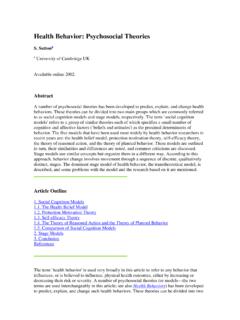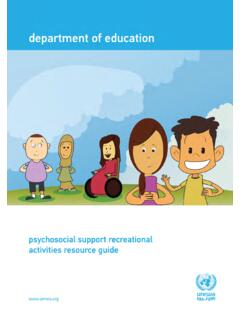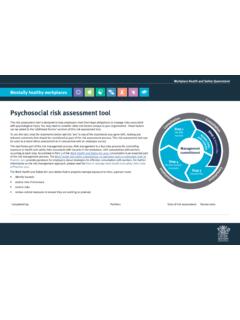Transcription of Guideline MENTAL HEALTH AND PSYCHOSOCIAL SUPPORT …
1 Guideline MENTAL HEALTH AND PSYCHOSOCIAL SUPPORT IN EMERGENCY SETTINGS IASC Reference Group on MENTAL HEALTH And PSYCHOSOCIAL SUPPORT in Emergency Settings 2007 Endorsed by IASC PrincipalsIasc Guidelines on MENTAL HEALTH and PSYCHOSOCIAL SUPPORT in Emergency settingsIasc Guidelines o n MENTAL HEALTH and PSYCHOSOCIAL SUPPORT in Emergency settingsspecific action sheets offer useful guidance on MENTAL HEALTH and PSYCHOSOCIAL SUPPORT , and cover the following areas:coordinationassessment, Monitoring and EvaluationProtection and Human Rights standardsHuman Resourcescommunity Mobilisation and supportHealth servicesEducationDissemination of InformationFood security and Nutritionshelter and site PlanningWater and sanitationThe Guidelines include a matrix, with guidance for emergency planning, actions to be taken in the early stages of an emergency and comprehensive responses needed in the recovery and rehabilitation phases.
2 The matrix is a valuable tool for use in coordination, collaboration and advocacy efforts. It provides a framework for mapping the extent to which essential first responses are being implemented during an Guidelines include a companion cD-ROM, which contains the full Guidelines and also resource documents in electronic format. Published by the Inter-agency standing committee (Iasc), the Guidelines give humanitarian actors useful inter-agency, inter-sectoral guidance and tools for responding effectively in the midst of 978-1-4243-3444-5 The IASC Guidelines for MENTAL HEALTH and PSYCHOSOCIAL SUPPORT in Emergency Settings reflect the insights of numerous agencies and practitioners worldwide and provide valuable information to organisations and individuals on how to respond appropriately during humanitarian emergencies.
3 ISAC Guidelines: Version mech 06/14/07 Page No. i Proofread by: Approved by: Iasc Guidelines on MENTAL HEALTH and PSYCHOSOCIAL SUPPORT in Emergency settingsISAC Guidelines: Version mech 06/14/07 Page No. PB Proofread by: Approved by: iasc Guidelines on MENTAL HEALTH and PSYCHOSOCIAL SUPPORT in Emergency settings iiiii Inter-Agency Standing Committee 2007 The Inter-Agency Standing Committee (IASC) was established in 1992 in response to General Assembly Resolution 46/182, which called for strengthened coordination of humanitarian assistance. The resolution set up the IASC as the primary mechanism for facilitating inter-agency decision-making in response to complex emergencies and natural disasters. The IASC is formed by the heads of a broad range of UN and non-UN humanitarian organisations.
4 For further information on the IASC, please access its website at: IASC publication will be available in different languages and can be obtained from the IASC website at: Cover page photos: International Rescue CommitteeSuggested citation: Inter-Agency Standing Committee (IASC) (2007). IASC Guidelines on MENTAL HEALTH and PSYCHOSOCIAL SUPPORT in Emergency Settings. Geneva: feedback or suggestions for the improvement of this publication, please e-mail: or acknowledgementsThe Inter-agency standing committee (Iasc) issues these Guidelines to enable humanitarian actors to plan, establish and coordinate a set of minimum multi-sectoral responses to protect and improve people s MENTAL HEALTH and PSYCHOSOCIAL well-being in the midst of an emergency. Populations affected by emergencies frequently experience enormous suffering.
5 Humanitarian actors are increasingly active to protect and improve people s MENTAL HEALTH and PSYCHOSOCIAL well-being during and after emergencies. a significant gap, however, has been the absence of a multi-sectoral, inter-agency framework that enables effective coordination, identifies useful practices, flags potentially harmful practices and clarifies how different approaches to MENTAL HEALTH and PSYCHOSOCIAL SUPPORT complement one another. The Guidelines offer essential advice on how to facilitate an integrated approach to address the most urgent MENTAL HEALTH and PSYCHOSOCIAL issues in emergency situations. I would like to thank the members of the Iasc Task Force on MENTAL HEALTH and PSYCHOSOCIAL SUPPORT in Emergency settings and specifically the Task Force co-chairs, WHO and Interaction, for achieving inter-agency consensus on minimum responses in this important area of humanitarian aid.
6 I call upon all those who are involved in humanitarian assistance to implement these Guidelines. Kasidis Rochanakornchair, Inter-agency standing committee Working Group Director, OcHa GenevaForewordISAC Guidelines: Version mech 06/14/07 Page No. PB Proofread by: Approved by: iasc Guidelines on MENTAL HEALTH and PSYCHOSOCIAL SUPPORT in Emergency settings ivvThe Task Force is grateful for comments on earlier versions of the matrix and/or selected action sheets by individual reviewers affiliated with the following organisations: NGOs: aga Khan Development Network; antares Foundation; austrian Red cross; BasicNeeds; caRE Usa; child Fund afghanistan; church of sweden aid; church World service; community and Family services International; Enfants R fugi s du Monde; Fundaci n Dos Mundos; Global Psycho-social Initiatives; Handicap International; Headington Institute; Human Rights Watch; Impact Foundation; International critical Incident stress Foundation.
7 International Rehabilitation council for Torture Victims; Jesuit Refugee service; M decins sans Fronti res switzerland; M decins sans Fronti res spain; Norwegian Refugee council; Palestinian Red crescent society; People in aid; Programa Psicosocial en chiapas; Psychologues du Monde; PULIH Foundation Indonesia; Refugees International; sangath centre Goa; south african Institute for Traumatic stress; sTEPs consulting social; Tanganyika christian Refugee service; Terre des Hommes Foundation; The Foundation for children and War; Turkish Red crescent society; War child Holland. Universities: Birzeit University West Bank; Boston University; columbia University; Harvard University; Johns Hopkins University; Karolinska Institutet; Kent state University; King s college; London school of Hygiene and Tropical Medicine; Northumbria University; Pomona college; san Jose state University; state University of New York; Uniformed services University of the HEALTH sciences; University of colombo; University of Geneva; University of Jaffna; University of Lund; University of Maryland; University of Melbourne; University of New south Wales; University of Oxford; University of Pennsylvania; University of south Dakota; University of Western sydney; University of the Philippines; Victoria University; Vrije Universiteit amsterdam.
8 Wageningen Inter-agency standing committee Task Force on MENTAL HEALTH and PSYCHOSOCIAL SUPPORT in Emergency settings wishes to thank everybody who has collaborated on the development of these guidelines. special thanks to the following agencies who are members of the Task Force and whose staff have developed these guidelines:action contre la Faim (acF) Interaction (co-chair), through: american Red cross (aRc) christian children s Fund (ccF) International catholic Migration commission (IcMc) International Medical corps (IMc) International Rescue Committee (IRc) Mercy corps save the children Usa (sc-Usa)Inter-agency Network for Education in Emergencies (INEE)International council of Voluntary agencies (IcVa), through: actionaid International caRE austria HealthNet-TPO M dicos del Mundo (MdM-spain) M decins sans Fronti res Holland (MsF-Holland) Oxfam GB Refugees Education Trust (RET) save the children UK (sc-UK)International Federation of Red cross and Red crescent societies (IFRc)International Organization for Migration (IOM)Office for the coordination of Humanitarian affairs (OcHa)United Nations children s Fund (UNIcEF)United Nations High commissioner for Refugees (UNHcR)United Nations Population Fund (UNFPa)World Food Programme (WFP)World HEALTH Organization (WHO) (co-chair)The WHO Department of MENTAL HEALTH and substance abuse (through funds from the Government of Italy)
9 And the christian children s Fund are gratefully acknowledged for making available substantial staff member time towards facilitating the Guidelines: Version mech 06/14/07 Page No. PB Proofread by: Approved by: iasc Guidelines on MENTAL HEALTH and PSYCHOSOCIAL SUPPORT in Emergency settings viviiTable of contentsForeword iii Acknowledgements ivChapter 1. Introduction 1 Background 1 MENTAL HEALTH and PSYCHOSOCIAL impact of emergencies 2 The guidelines 5 How to use this document 7 core principles 9 Frequently asked questions 16 Chapter 2. Matrix of Interventions 20 Chapter 3. Action Sheets for Minimum Response 30 CooRdInAtIon : Establish coordination of intersectoral MENTAL HEALTH and PSYCHOSOCIAL SUPPORT 33 ASS eSSMent, Mon Ito RI nG A nd evAlu AtIon : conduct assessments of MENTAL HEALTH and PSYCHOSOCIAL issues 38 : Initiate participatory systems for monitoring and evaluation 46 PRote CtIon And huMA n RIGht S S tAnd AR dS : apply a human rights framework through MENTAL HEALTH and PSYCHOSOCIAL SUPPORT 50 : Identify, monitor, prevent and respond to protection threats and failures through social protection 56.
10 Identify, monitor, prevent and respond to protection threats and abuses through legal protection 64 h uMA n R eSou RC eS : Identify and recruit staff and engage volunteers who understand local culture 71 Table of contents Others ( professional associations, government agencies, consortia, networks): american Psychiatric association; american Psychological association; asian Harm Reduction Network; canadian Forces MENTAL HEALTH services ; cellule d Urgence M dico-Psychologique saMU de Paris; centre Hospitalier saint-anne; centers for Disease control and Prevention (cDc); consortium of Humanitarian agencies sri Lanka; consultative Group on Early childhood care and Development; Department of Human services , Melbourne; European Federation of Psychologists associations; Food and agriculture Organization of the United Nations (FaO); Hellenic centre of MENTAL HEALTH ; Iasc Early Recovery cluster; Iasc HEALTH cluster; Iasc camp coordination and camp Management cluster; Iberoamerican Eco-Bioethics Network for Education, science and Technology; International alliance for child and adolescent MENTAL HEALTH and schools; International association for child and adolescent Psychiatry and allied Professions; International society for Traumatic stress studies; intervention: international Journal of MENTAL HEALTH , PSYCHOSOCIAL Work and counselling in areas of armed conflict; Mangrove PSYCHOSOCIAL SUPPORT and coordination Unit.


